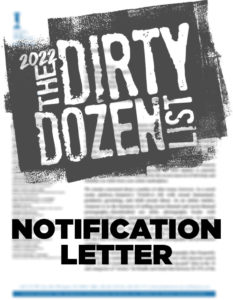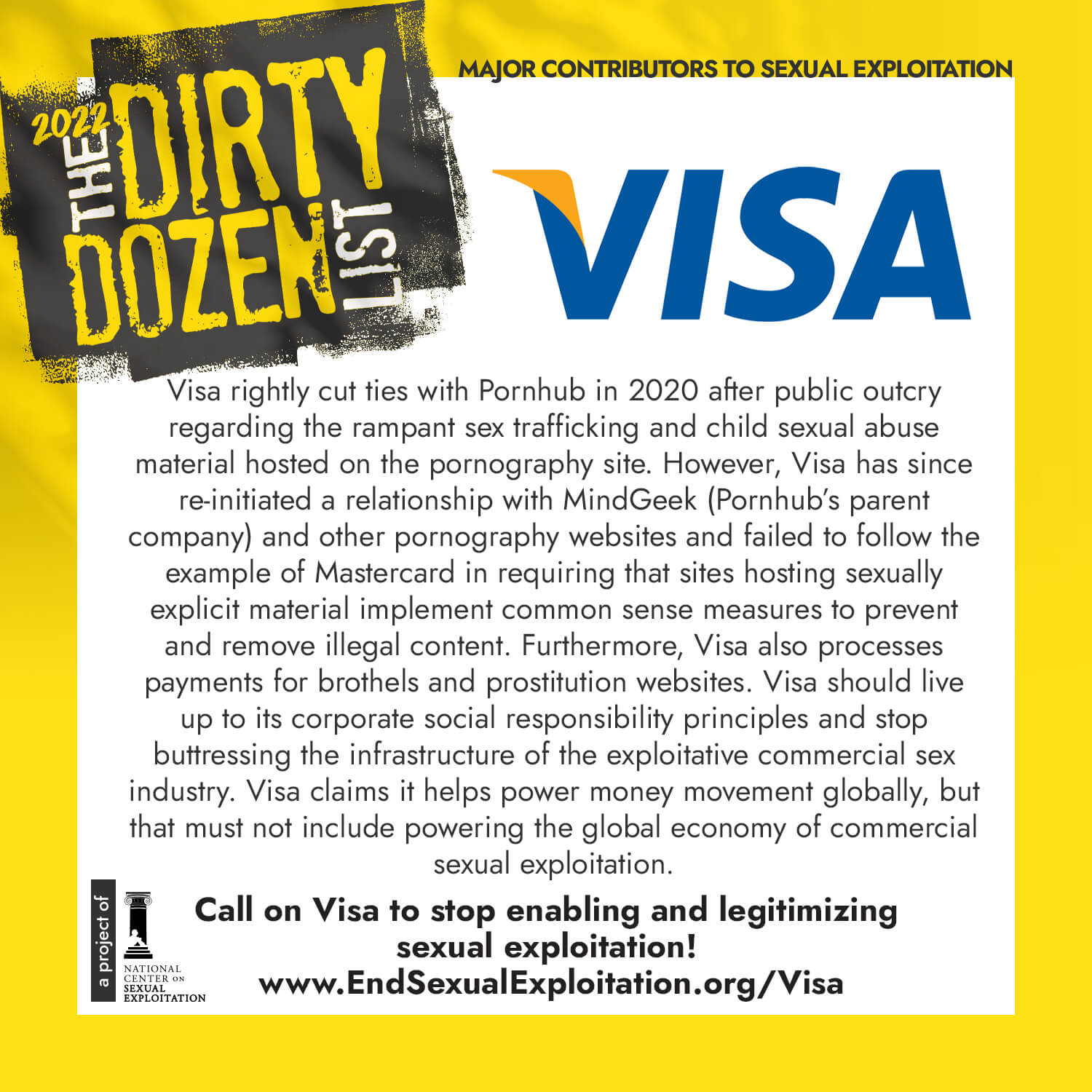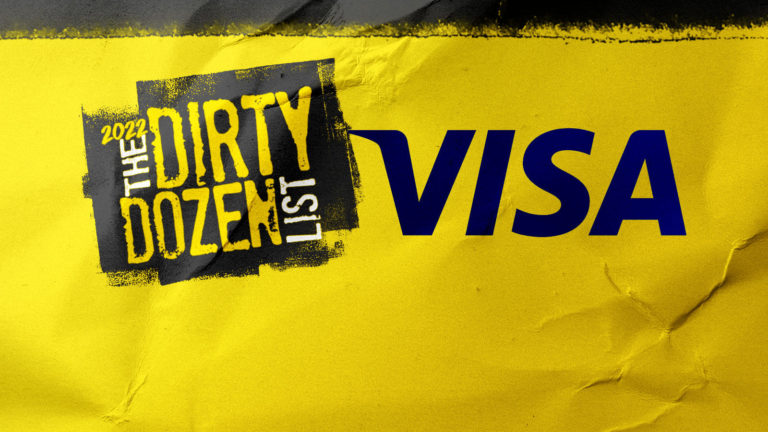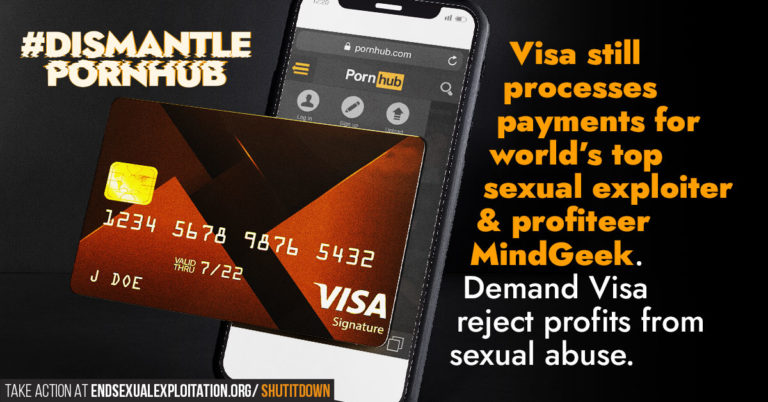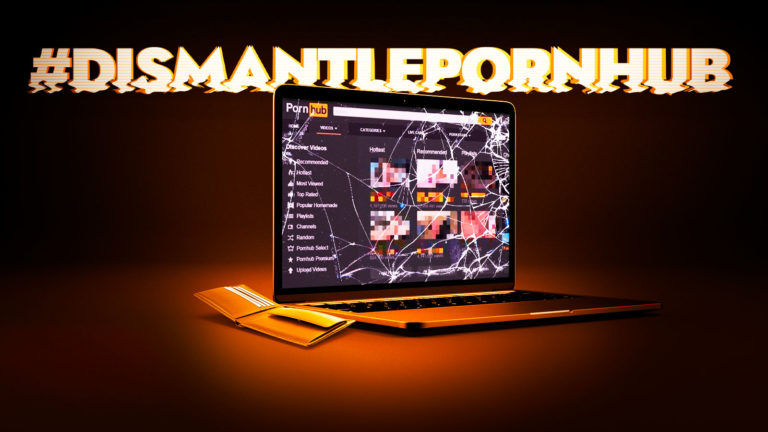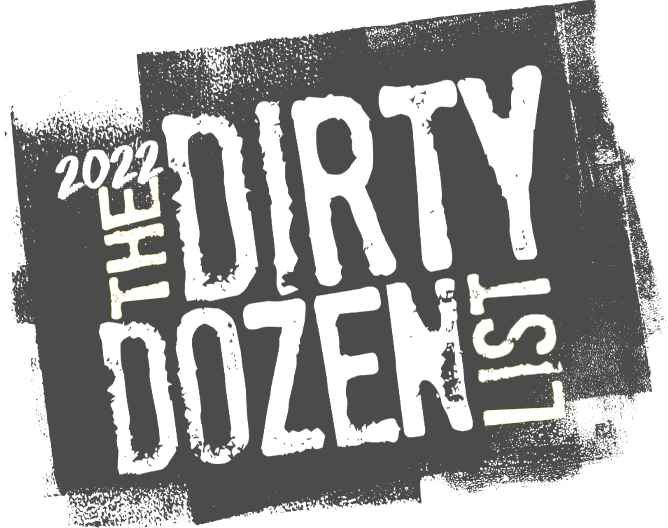
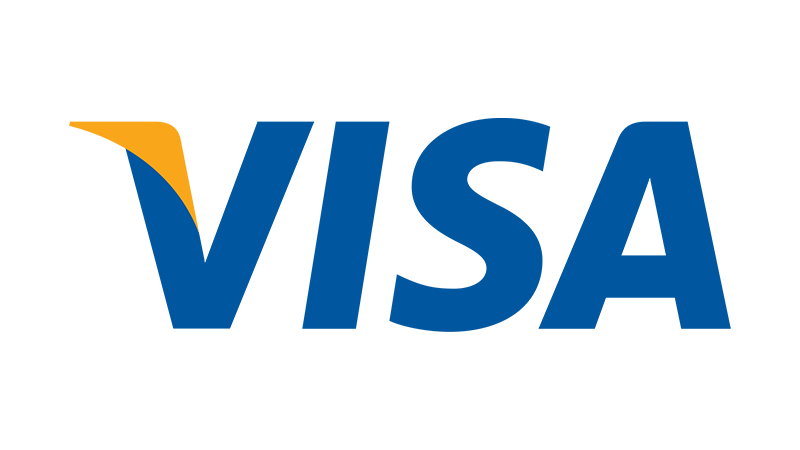
The Problem
Updated 10/28/24: A July 2024 NBC News article revealed Visa and Mastercard are still being used in the sale of nonconsensual deepfake pornography via “hidden links” that lead to a subscription service, which facilitates payments for the material while hiding most of the content and creators.
Updated 07/29/22: A federal judge rejected Visa’s request to be dismissed from a lawsuit brought by a child sex abuse survivor against Pornhub’s parent company, MindGeek, ruling that there was enough evidence to show that Visa “knowingly provid[ed] the tool used to complete the crime” of distributing child sex abuse material. Following the judge’s ruling, both Visa and Mastercard cut ties with MindGeek-owned advertising arm TrafficJunky. NCOSE continues to call on both major credit card companies to completely sever ties with MindGeek, as well as with its two biggest competitors – XVideos and XHamster – both of which have also been shown to be rife with child sex abuse material and sex trafficking.
The judge’s landmark decision could well mean greater accountability in the financial service industry for their role in enabling and profiting from sexual exploitation and abuse.
Excerpts from the judge’s unusually strong decision below (read it in full here):
If Visa was aware that there was a substantial amount of child porn on MindGeek’s sites, which the Court must accept as true at this stage of the proceedings, then it was aware that it was processing the monetization of child porn, moving money from advertisers to MindGeek for advertisements playing alongside child porn like Plaintiff’s videos. (page 11)
When the Court couples MindGeek’s expansive content removal with allegations that former MindGeek employees have reported a general anxiety at the company that Visa might pull the plug, it does not strike the Court as fatally speculative to say that Visa — with knowledge of what was being monetized and authority to withhold the means of monetization — bears direct responsibility (along with MindGeek) for MindGeek’s monetization of child porn, and in turn the monetization of Plaintiff’s videos. (page 15)
Such meeting of the minds or agreement need not be explicit but can be inferred if Visa “entered into a joint enterprise with consciousness of its general nature and extent.” Paguirigan v. Prompt Nursing Emp. Agency LLC, 286 F. Supp. 3d 430, 440 (E.D.N.Y. 2017). Visa allegedly did just that. Plaintiff adequately alleges that Visa knew that MindGeek’s websites were teeming with monetized child porn from its own due diligence and discussions and negotiations with MindGeek, PayPal’s decision to cease doing business with MindGeek, communications from advocates with which Visa interacted, and from the New York Times article. (page 23)
Further, in November 2019, Visa’s competitor PayPal terminated its relationship with MindGeek, issuing a public statement that “[PayPal] explicitly prohibits the use of [its] services for the sale of materials that depict criminal behavior[.]” (Id. ¶ 286.) Visa also landed on a list maintained by anti-trafficking advocates for processing payments for “pornography websites, including those hosting content fetishizing minors[.]” (Id. ¶ 288.) Visa responded with a statement that it only permits transactions for the purchase or sale of lawful products or services. (Id. ¶ 289.) Anti-sex trafficking advocates also sent various letters and emails to Visa detailing MindGeek’s child trafficking venture. (Id. ¶¶ 291-95.) Visa responded: “Maintaining a neutral stance under the law is vital for the free flow of commerce.” (Id. ¶ 297.) (Page 8)
> Read this article from The Dispatch by David French: A Crucial Court Case Exposes the Darkness of America’s Worst Industry.
Note: The National Center on Sexual Exploitation first brought evidence of child sexual abuse material and sex trafficking on Pornhub to Visa’s attention in early 2020 and sent a letter with 62 survivors and advocates representing 11 countries in March 2021 requesting it cut ties with all MindGeek-owned entities. Despite the fact that Visa opened an investigation into Pornhub at NCOSE’s urging, it wasn’t until the New York Times published its December 2020 exposé revealing child sexual abuse material proliferates on the site that Visa finally acted to cut ties with Pornhub. Visa has repeatedly refused to meet with survivors.
Original issues as described in the 2022 Dirty Dozen List
Visa rightly cut ties with Pornhub in 2020 after public outcry regarding the rampant sex trafficking and child sexual abuse material hosted on the pornography site. However, Visa has since re-initiated a relationship with MindGeek (Pornhub’s parent company) and other pornography websites and failed to follow the example of Mastercard in requiring that sites hosting sexually explicit material implement common sense measures to prevent and remove illegal content.
Furthermore, Visa also allows transactions for brothels and prostitution websites. Visa should live up to its corporate social responsibility principles and stop buttressing the infrastructure of the exploitative commercial sex industry. Visa claims it helps power money movement globally, but that must not include powering the global economy of commercial sexual exploitation.
Call on Visa to stop enabling and legitimizing sexual exploitation! Take action below!
Visa is a worldwide leader in digital payments and the 10th most valuable company in the world. Visa has 50% of the market share of total card payments outside of China, with 206 billion annual transactions totalling 12.5 trillion dollars.
On paper, Visa appears to have a strong stance against sexual abuse and exploitation. For example, the Visa Modern Slavery Act Transparency Statement claims: “Visa is committed to ensuring modern forms of slavery and human trafficking are not present in our supply chains and in our business”. Visa’s Corporate Responsibility and Sustainability Report speaks of their commitment to “transaction integrity” and assigns their Global Brand Protection Program to manage situations where transactions are made for illegal activities, such as “child abuse images”. These public commitments on Visa’s behalf ought to forestall them facilitating payments for companies where sex trafficking and child sexual abuse material abound. However, this is unfortunately not the case.
Visa rightly cut ties with Pornhub in 2020 after public outcry and a New York Times exposé regarding the rampant sex trafficking, child sexual abuse, rape, and non-consensually distributed videos on this site. Yet despite this, Visa re-initiated relationships with other pornography sites, including those owned by MindGeek, the parent company of Pornhub. They also failed to enact common sense requirements for pornography sites to verify age and consent of those depicted in content, and to take proactive measures against illegal and abusive content. Finally, Visa continues to allows transactions for brothels and prostitution websites.
Pornography
In late 2021 Visa announced that, despite terminating their relationship with Pornhub, it would continue to allow payments for other pornography sites, including those owned by MindGeek, so long as these sites only hosted “professional” studio-produced pornography. This decision is problematic for a number of reasons.
Firstly, as MindGeek is the parent company of Pornhub, they are responsible for the criminal activity hosted on the Pornhub site and they profit from these crimes. In fact, a judge recently denied MindGeek’s motion to dismiss a class action lawsuit which sought to hold them accountable for the child sexual abuse material on their platform. If Visa truly wished to disassociate itself with the abuses happening on Pornhub, it would need to cut financial ties with all MindGeek entities.
Secondly, Visa’s decision seems to rest on the assumption that professional studio-produced pornography is free of abusive and/or illegal practices. Unfortunately, this is not true. The abusive content discovered on Pornhub was sometimes studio-produced. For example, GirlsDoPorn was a “professional” pornography company and a verified channel on Pornhub. It had documentation which supposedly verified the consent and age of their “performers”. However, these “performers”, which included minors, later testified that the GirlsDoPorn owners and employees coerced, tricked, and blackmailed them into appearing in the videos.
Thankfully, GirlsDoPorn’s abusive practices were eventually exposed and they were rightly convicted of sex trafficking, sex trafficking of a minor, and the production of “child pornography”. But how many other professional pornography companies are using similar tactics? We know that GirlsDoPorn is not an isolated case. There have been many other cases of pornography producers, including very high profile ones, being charged with sex trafficking or rape. There have also been cases of male pornography performers being charged with raping female performers, when a scene being filmed was not consensual.
Research also speaks to the way the pornography industry often preys on socio-economic vulnerabilities and abuses pornography performers, whether the performers have been trafficked or not. For example, a 2021 qualitative study found that many pornography performers had vulnerabilities of financial insecurity, young age, poor mental health, and histories of enduring sexual violence. In the same study, the performers also testified that they endured manipulation, coercion and violence while in the pornography industry.
This is not even to mention the cascades of research demonstrating the devastating impact pornography has on public health.
Visa is legitimizing and normalizing the predatory pornography industry by facilitating payments for it, despite the harms the industry inflicts on performers, sex trafficking and child sexual abuse victims, consumers, and society at large.
Brothels And Online Prostitution
Visa facilitates payments for brothels operating in Nevada, despite the fact that prostitution causes physical and psychological trauma that cannot be regulated away even within a legal system. Sex buyers are using Visa cards to buy people for sexual exploitation. One woman who survived being prostituted in two legal brothels in Nevada described her experience as follows:
“We did not have the “independent contractor” freedom to turn down buyers. Management required us to line up when someone arrived at the brothel. Once picked from the lineup, we would bring the sex buyer back to our room where he was allowed to do whatever he wanted with us… The violent-natured men I encountered in legal brothels are no different than the men buying sex on the streets. I cannot count the number of times I physically fought with men in the brothels and how many times I have been raped because I was too scared to fight back.”
Furthermore, audits have found that a significant number of sex trafficking victims are still being sex trafficked into Nevada brothels—which means Visa is helping facilitate these crimes. (You can learn more about Nevada, which we are currently engaged in a lawsuit against, here.)
Visa is also facilitating payments for Seeking (formerly Seeking Arrangement), a “sugar dating” prostitution platform that targets college students, single moms, and people suffering from the economic uncertainty of COVID-19 to be sexually used by wealthier, older men. Myriad risks face young, vulnerable women when they enter into the power imbalance of sugar dating. This includes the risk of sex trafficking, assault, rape, physical violence, psychological manipulation, economic dependence, and more. Research shows that sugar dating should fall under the definition of prostitution, and so Visa is facilitating payments that not only cause harm but are also legally dubious at minimum. (You can learn more about Seeking, which was placed on the 2021 Dirty Dozen List, here.)
Finally, Visa is facilitating payments for OnlyFans, a subscription site where “fans” pay a monthly membership fee and tips to see a “content creator’s” videos. This site is known to be primarily used to sell people for prostitution and pornography. Similar to Seeking Arrangement, OnlyFans has taken advantage of the deepening economic vulnerabilities women have experienced during the pandemic. OnlyFans has insufficient verification measures for age or consent which has resulted in children and victims of sex-trafficking being abused and exploited through their platform. Experts – including law enforcement – are hailing it as the new backpage.com, which was shut down for facilitating sex trafficking. (You can learn more about OnlyFans, which is on the 2022 Dirty Dozen List, here.)
By facilitating financial transactions for brothels and online prostitution platforms, Visa is legitimizing an exploitative industry which causes harm to vulnerable individuals and is rife with crimes of sex-trafficking.
Visa Fails To Enact Commonsense Safety Measures
In April 2021, Mastercard instituted new policies for combatting sex-trafficking and child abuse in pornography. Under their new policies, pornography websites they work with would be required to verify the age and identity of everyone depicted in or uploading content. Mastercard also put requirements on banks that processed payments for pornography sites, saying the banks “will need to certify that the seller of adult content has effective controls in place to monitor, block and, where necessary, take down all illegal content.”
While NCOSE is in on-going conversation with Mastercard regarding implementation and improvements for this policy, this is a notably improved industry standard for credit card companies’ corporate responsibility. Visa ought to have followed Mastercard’s lead and adopted similar, or even stronger, policies. However, they failed to do so. Requiring that measures be taken to prevent sex-trafficking and child abuse is a common-sense and bare minimum approach, and the fact that Visa declined to do even this can only mean that they are willing to profit from such abhorrent crimes. Further, Visa has declined multiple invitations to meet with survivors of the pornography industry, including survivors of sexual abuse whose images were posted on pornography platforms, to discuss these matters.
Visa should live up to the public commitments made in its Modern Slavery Act Transparency Statement and Corporate Responsibility and Sustainability Report, which promise no tolerance for human trafficking or child sexual abuse material. It should stop buttressing the infrastructure of the exploitative commercial sex industry, where these crimes are rampant.
See Our Recommendations For Improvement
Visa should cease facilitating payments for all pornography and prostitution platforms, including camming sites like OnlyFans and sugar dating sites like Seeking (formerly SeekingArrangement). While we want to see Visa completely cut ties with the pornography industry, at the very least they should require pornography sites take common sense measures against illegal and abusive content, such as verifying age and consent of all persons depicted.
